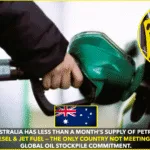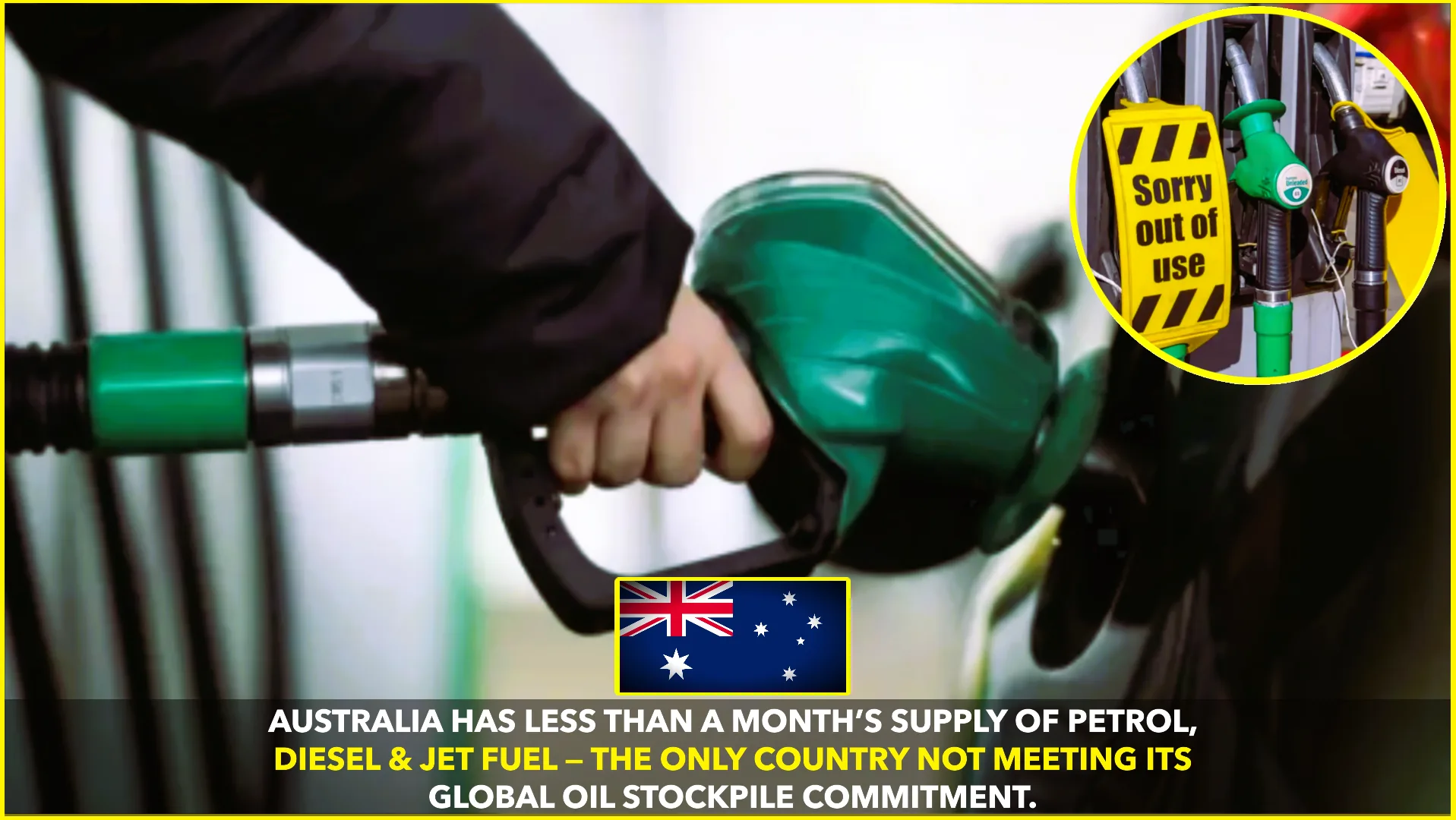Australia is facing a looming fuel crisis, with government data revealing that the country has less than a month’s worth of petrol, diesel, and jet fuel reserves — putting it at odds with its international energy treaty obligations.
According to The Australian Financial Review, Australia is the only country among International Energy Agency (IEA) members that fails to meet its requirement to hold at least 90 days’ worth of oil imports in reserve (AFR).
A Nation Running on Fumes
As of October 2025, official estimates show Australia has roughly 28 days of petrol, 24 days of diesel, and only 20 days of jet fuel in storage — figures that fall drastically short of international standards. The situation has triggered fresh concerns that the country’s supply chains could collapse in the event of a global oil disruption.
News.com.au reported that such a shortage could make it difficult to keep supermarket and pharmacy shelves stocked, as well as move essential goods across states if overseas fuel shipments were interrupted (News.com.au).
A Long and Fragile Supply Line
Australia’s dependence on imported refined fuels is the core of the problem. The nation imports over 90% of its refined petroleum, relying heavily on supply chains stretching across Asia. A 2020 Liquid Fuel Security Review conducted by the Department of Climate Change, Energy, the Environment and Water found that while Australia could withstand a temporary drop in Middle Eastern supplies, it would be highly exposed to disruptions in North-East Asian refineries (Department of Climate Change, Energy, the Environment and Water).
The same review identified Singapore, South Korea, and Japan as Australia’s top three suppliers of refined oil products, making the nation’s fuel lifeline vulnerable to any regional geopolitical or economic instability.
Experts Sound the Alarm
Energy expert Tony Wood, director of the energy program at the Grattan Institute, warned that Australia’s situation is uniquely risky because of its reliance on diesel imports — critical for freight transport, agriculture, and mining.
“We’re at the tail end of a long supply line, and that makes us uneasy sometimes,” Wood said, pointing out that a disruption anywhere along that route could quickly cripple domestic logistics and industries (Grattan Institute).
Diesel Dependency and Transport Risk
Australia’s economy depends heavily on long-haul trucking to transport goods between cities and states. Diesel shortages could paralyze these routes, halting the movement of groceries, pharmaceuticals, and industrial materials.
According to ABC News, this dependency has become more severe since several domestic oil refineries were shut down over the past decade, leaving just two major refineries in operation (ABC News).
Government’s Efforts and Limitations
In response to mounting pressure, the Australian government introduced the Fuel Security Bill 2021, designed to boost onshore fuel reserves and ensure local refining capacity. The law also established a Minimum Stockholding Obligation (MSO) for major fuel suppliers to maintain certain reserve levels (Parliament of Australia).
However, experts argue that these policies are insufficient to meet the IEA’s 90-day commitment. Norton Rose Fulbright noted that while the MSO improves accountability, Australia still lacks adequate fuel infrastructure and remains overly dependent on “just-in-time” imports (Norton Rose Fulbright).
A Potential Economic Shock
If a global crisis — such as a major conflict or refinery shutdown in Asia — were to occur, Australia could see a severe impact on its economy within weeks. Transport, aviation, and logistics sectors would be among the first to feel the pressure, followed by retail and healthcare.
The Sydney Morning Herald reported that during previous global supply tensions, even short-term disruptions caused sharp fuel price spikes and panic buying, demonstrating how quickly vulnerabilities can surface (SMH).
The Road Ahead
Experts suggest that the solution lies in a mix of stronger fuel storage, diversification of import routes, and investment in renewable alternatives like electric transport and hydrogen. Building strategic reserves across different states could also provide regional resilience during future crises.
Australia’s heavy dependence on imported fuel makes it one of the most exposed economies among advanced nations. Unless urgent measures are taken, a global shock in oil supply could leave the country running on empty — literally.










